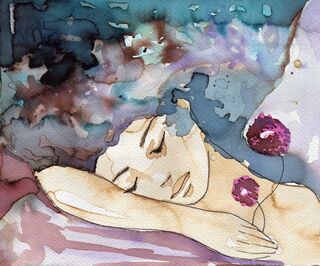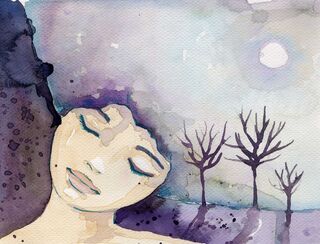Sleep
REM vs Deep: The Most Important Type of Sleep
REM and deep sleep are commonly confused. Is one better than the other?
Posted June 4, 2022 Reviewed by Vanessa Lancaster
Key points
- While all types of sleep appear to be essential, deep wave sleep could be considered the most essential.
- If your sleep is restless and non-restorative, you may lack sufficient deep sleep.
- REM sleep assists memory differently than deep sleep, focusing on social-emotional memories and even salvaging forgotten memories.
"I have to get my deep REM sleep," expresses a common confusion about two very different types of sleep. Deep sleep and rapid eye movement (REM) sleep are not the same; they do not even overlap. They each have different brain wave patterns and physiological characteristics, occur at different times of our sleep cycle, and play different roles in our wellbeing. Which is most important?
While all types of sleep appear to be essential, deep wave sleep could be considered the most essential. It does many things for us, supporting our entire central nervous system. Its signature move makes us feel restored when we get it and unrefreshed when we don’t. If your sleep is restless and non-restorative, you may lack sufficient deep sleep. If you have trouble retaining new information, you may be lacking REM and/or deep sleep.

Both types of sleep occur several times throughout the night. (Reading about the stages of sleep can be confusing because the 4th type listed is often REM, but Stage 4 sleep is deep. Stages 3 and 4 are often lumped together as deep sleep, thus much confusion).
One sleep cycle is about 90 minutes, so we typically sleep for four to six cycles per night. Some cycles have more deep delta sleep, some more REM. Some have both. No cycle is exactly like another because that is just how intricate and specialized our whole system is.
REM and deep have important differences. Let's start with deep wave sleep. It goes by many names, including delta wave sleep (its predominant brain wave), Stage 3-4, Stage 3 or Stage 4 Sleep.
Deep Wave Sleep
- Deep sleep is one type, the deepest type of non-REM sleep. I like to think of it as when our sleep sleeps.
- Slow delta brain waves oscillate at about two to four waves per second and make up less than 25 percent of our nightly slumber.
- Deep sleep occurs after shallow sleep (Stages 1 and 2) within a 90-minute sleep cycle.
- Deep sleep is generated from the frontal lobe and displays the brain at its most coordinated. It is synchronized with other brain waves, unlike the disharmony of wave patterns during REM sleep.
- This “neural resonance” may help the lymphatic system cleanse our brains by flushing them of beta-amyloid plaques and misshapen proteins associated with Alzheimer’s disease.
- Deep sleep is more prevalent in the first half of the night. The brain seems to prioritize it, dipping down into deep sleep about an hour after you nod off and then a few more times throughout the night.
- Deep sleep tends to disappear in the last cycles of the night when REM increases. (Thank goodness because it is difficult to wake from deep sleep, and if someone or something dares do this, you may feel disoriented and irritable).
- Growth hormone production occurs in deep sleep and both decrease with age.
- When we lack deep wave sleep, our risk for almost every disease goes up. The research is clear: we need deep wave sleep to be well.
- Things that zap deep sleep include alcohol, benzodiazepines, opioid medications, lack of activity, and oversleeping (sleeping past your regular wake-up time).

REM Sleep
- REM Sleep is quite different from the other stages because the brain appears awake, but the body stays immobile. It is called paradoxical sleep for this reason.
- REM brain waves are shorter than delta waves and are not synchronized like deep wave sleep.
- REM usually occurs later in a 90-minute sleep cycle and commonly just before waking.
- Dreams commonly occur during REM sleep, but muscles lose all tone, which prevents (most of) us from acting out our dreams.
- However, blood pressure, heart rate, and breathing quicken, and our eyes dart beneath our eyelids, thus named rapid-eye-movement sleep, regardless of whether we are dreaming.
- REM sleep is important for learning. It strengthens memories the night after you learn something new, like clicking “Save” for a new document. (Power naps may help this too).
- REM sleep assists memory differently than deep sleep, focusing on social-emotional memories and even salvaging forgotten memories.
- REM also helps us make connections our brain wouldn’t even dare try during the day. It is incredibly creative in the connections it attempts beyond what our daytime thinking is capable of.
- REM is often followed by brief periods of wakefulness, which are normal in a sleep cycle. If you wake briefly several times a night but fall back to sleep, you have not missed any of the good stuff.
- REM sleep is no longer assumed to be just restorative; it is also preparatory. It stimulates the central nervous system, preparing us to wake up. This is ideal just before your alarm goes off.
- REM sleep is also very susceptible to the negative effects of alcohol, just like deep sleep. Alcohol and quality sleep do not mix well.
Read about the Rules of Sleep to train your brain to get more deep and sufficient REM each night.
References
Del Pozo, J. (August, 2022) Restorative Sleep Workshop: The Art, Science, and Spiritual Practice of Sleep.
Carley, D. W., & Farabi, S. S. (2016). Physiology of Sleep. Diabetes spectrum : a publication of the American Diabetes Association, 29(1), 5–9. https://doi.org/10.2337/diaspect.29.1.5
Peever, J., & Fuller, P. M. (2016). Neuroscience: A Distributed Neural Network Controls REM Sleep. Current biology : CB, 26(1), R34–R35. https://doi.org/10.1016/j.cub.2015.11.011
Walker, M. (2017). Why We Sleep: Unlocking the Power of Sleep and Dreams. Scribner: NY, NY.


